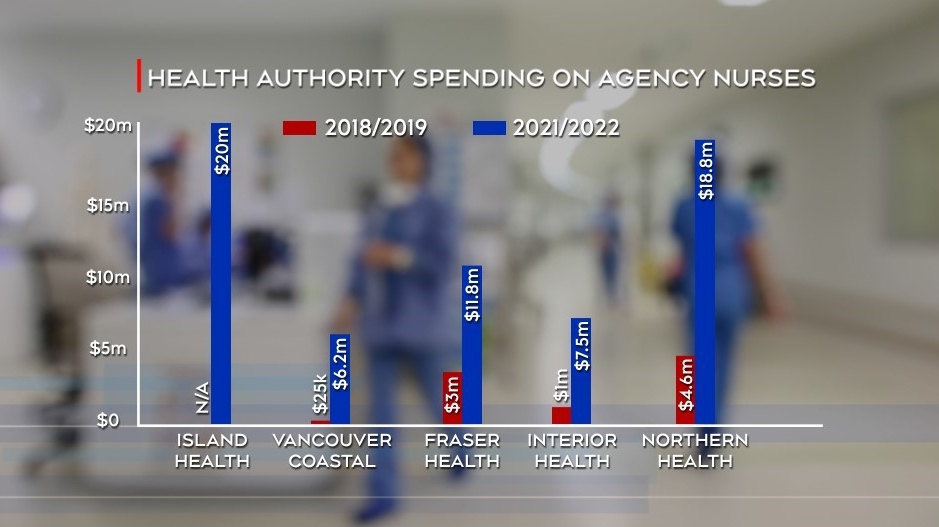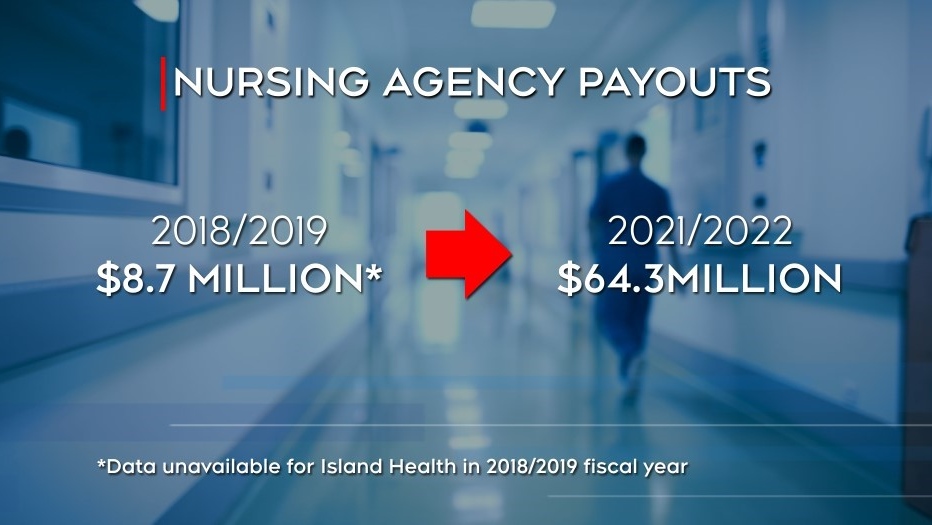'A disaster': $64M in a single year to for-profit B.C. nursing companies amid 7-fold increase
CTV News has obtained exclusive information painting a picture of how the private health-care sector is increasingly propping up B.C.’s public system, with billings ballooning up to seven-fold in just a few years.
Agency or travelling nurses were introduced to the province only a few years ago to backfill nursing vacancies, often in smaller rural hospitals and facilities. Over time, the cost to taxpayers has skyrocketed, going from at least $8.7 million in the 2018-19 fiscal year, to $64 million in the 2021-22 fiscal year.
The amount varied widely depending on the health authority and its needs pre-pandemic versus now:
Vancouver Coastal spent just $25,000 on such nurses bin 2018-19, but three year later was relying on $6.2 million of services. Fraser Health went from $3 million to $11.8 million, Interior Health from $1 million versus $7.5 million, and Northern Health skyrocketed from $4.6 million to $18.8 million.
Vancouver Island Health Authority said while it had hired agency nurses in the 2018-19 fiscal year, it couldn’t compile the total, but spent a whopping $20 million by 2021-22.
“Total expenditure includes service hours plus reimbursable travel expenses, accommodation expenses, and applicable premiums, etc.,” read a footnote in the health authorities’ responses.
BCNU UNSURPRISED AT FIGURES
Earlier this month, CTV News was first to report that nurses employed by for-profit companies are propping up the health-care system to the extent that half or more of the staff on any given shift can be temp workers who don’t know the ins and outs of the facility they’re working in – and even that may be an underestimate.
“There are units where it's all agency nurses,” said BC Nurses Union president, Aman Grewal after returning from an engagement tour with members Thursday. “
"Even care aides and (licensed practical nurses) – how dire is the system that every single profession in health care is requiring travel nursing?”
Grewal said pay that’s 50 to 100 per cent higher – without forced overtime or the risk of cancelled time off – is increasingly drawing nurses into the private sector, where they then come back and work at some of the same public facilities they left. The private companies then profit from health authorities desperate to maintain services.
“If the government has the money and is paying these big amounts to travel nurses, pay our nurses what they're worth,” Grewal said. “If you're short one person, that closes down an ER – whether that's a physician or a nurse – so the system is already broken."
 Every health authority in B.C. that was able to provide data has upped its spending on agency nurses since the 2018-19 fiscal year. (CTV)
Every health authority in B.C. that was able to provide data has upped its spending on agency nurses since the 2018-19 fiscal year. (CTV)
THE VICIOUS CYCLE EXPLAINED
A University of Victoria nursing professor is baffled that British Columbia has embraced agency nurses in recent years, given the spiralling costs and irreversible issues that have plagued Quebec for the past two decades.
“It had been tried many places; it always proved to be a disaster,” said Damien Contandriopoulos. “Once a system is sufficiently disorganized from the inside, the damage is awfully hard and extremely expensive to control.”
He says not only do nurses flee the public sector for better working conditions in the private sector, but the quality of care suffers because the long-time teams that know how to make the best use of each other’s strengths and specialities are constantly disrupted by new coworkers who don’t have the rapport and workflow that come with close side-by-side work.
“The main element nurses are aiming for when they work for an agency is freedom,” said Contandriopoulos, pointing to the fatigue that has crushed staff working long hours through the pandemic.
“The current challenge for the system is making sure hospital administrators respect our nurses, listen to what they’re asking for and try to find innovative solutions.”
HEALTH AUTHORITIES DEFEND EXPENDITURES
B.C.’s five health authorities sent nearly-identical statements insisting that agency nurses are only used as a last resort and take up only a fraction of nursing expenditures compared to full-time staff. The health authorities also claim some of the increase is due to the contracting of private nurses to staff vaccination clinics and COVID-19 contact tracing efforts, though they acknowledged hospitals and care homes, for example, have made considerable use of them.
“We're in a staffing shortage in many areas, so we'll use all avenues to secure staff to maintain safe, quality care and a continuation of services,” said Dr. Shallen Letwin, vice president of clinical operations for Interior Health and the only health official to agree to an interview.

In emails, B.C.’s health authorities confirmed they pay the agencies approximately $70.45 per hour to hire the nurses, but the amount the nurse is paid can vary widely. A review of TravelNurse.ca turned up rates as low as $40 per hour for Licensed Practical Nurses to $85 per hour offered for Registered Nurses.
Registered Nurses working full-time, union jobs in Island Health, for example, make $36 to $55 per hour.
CTVNews.ca Top Stories

BREAKING Prime Minister Trudeau to meet Donald Trump at Mar-a-Lago
Prime Minister Justin Trudeau has landed in West Palm Beach, Fla., on Friday evening to meet with U.S.-president elect Donald Trump, sources confirm to CTV News.
'Mayday! Mayday! Mayday!': Details emerge in Boeing 737 incident at Montreal airport
New details suggest that there were communication issues between the pilots of a charter flight and the control tower at Montreal's Mirabel airport when a Boeing 737 made an emergency landing on Wednesday.
Hit man offered $100,000 to kill Montreal crime reporter covering his trial
Political leaders and press freedom groups on Friday were left shell-shocked after Montreal news outlet La Presse revealed that a hit man had offered $100,000 to have one of its crime reporters assassinated.
Cucumbers sold in Ontario, other provinces recalled over possible salmonella contamination
A U.S. company is recalling cucumbers sold in Ontario and other Canadian provinces due to possible salmonella contamination.
John Herdman resigns as head coach of Toronto FC
John Herdman, embroiled in the drone-spying scandal that has dogged Canada Soccer, has resigned as coach of Toronto FC.
Musk joins Trump and family for Thanksgiving at Mar-a-Lago
Elon Musk had a seat at the family table for Thanksgiving dinner at Mar-a-Lago, joining President-elect Donald Trump, Melania Trump and their 18-year-old son.
Billboard apologizes to Taylor Swift for video snafu
Billboard put together a video of some of Swift’s achievements and used a clip from Kanye West’s music video for the song “Famous.”
Trudeau says no question Trump is serious on tariff threat
Prime Minister Justin Trudeau says incoming U.S. president Donald Trump's threats on tariffs should be taken seriously.
In a shock offensive, insurgents breach Syria's largest city for the first time since 2016
Insurgents breached Syria's largest city Friday and clashed with government forces for the first time since 2016, according to a war monitor and fighters, in a surprise attack that sent residents fleeing and added fresh uncertainty to a region reeling from multiple wars.

































